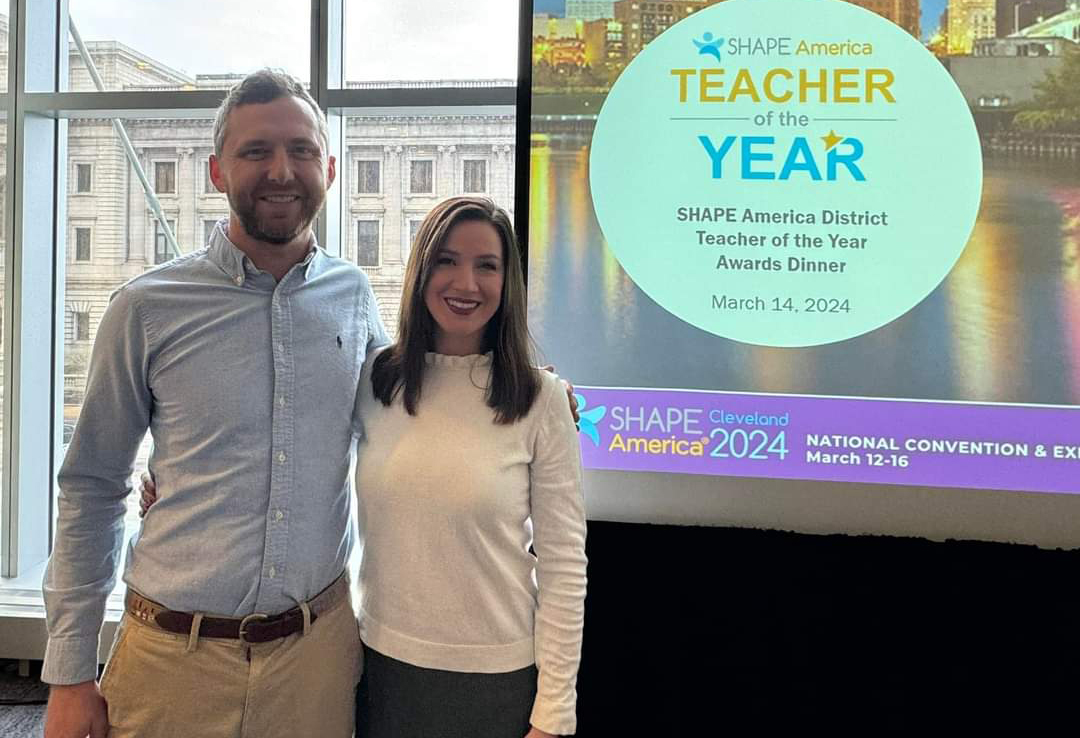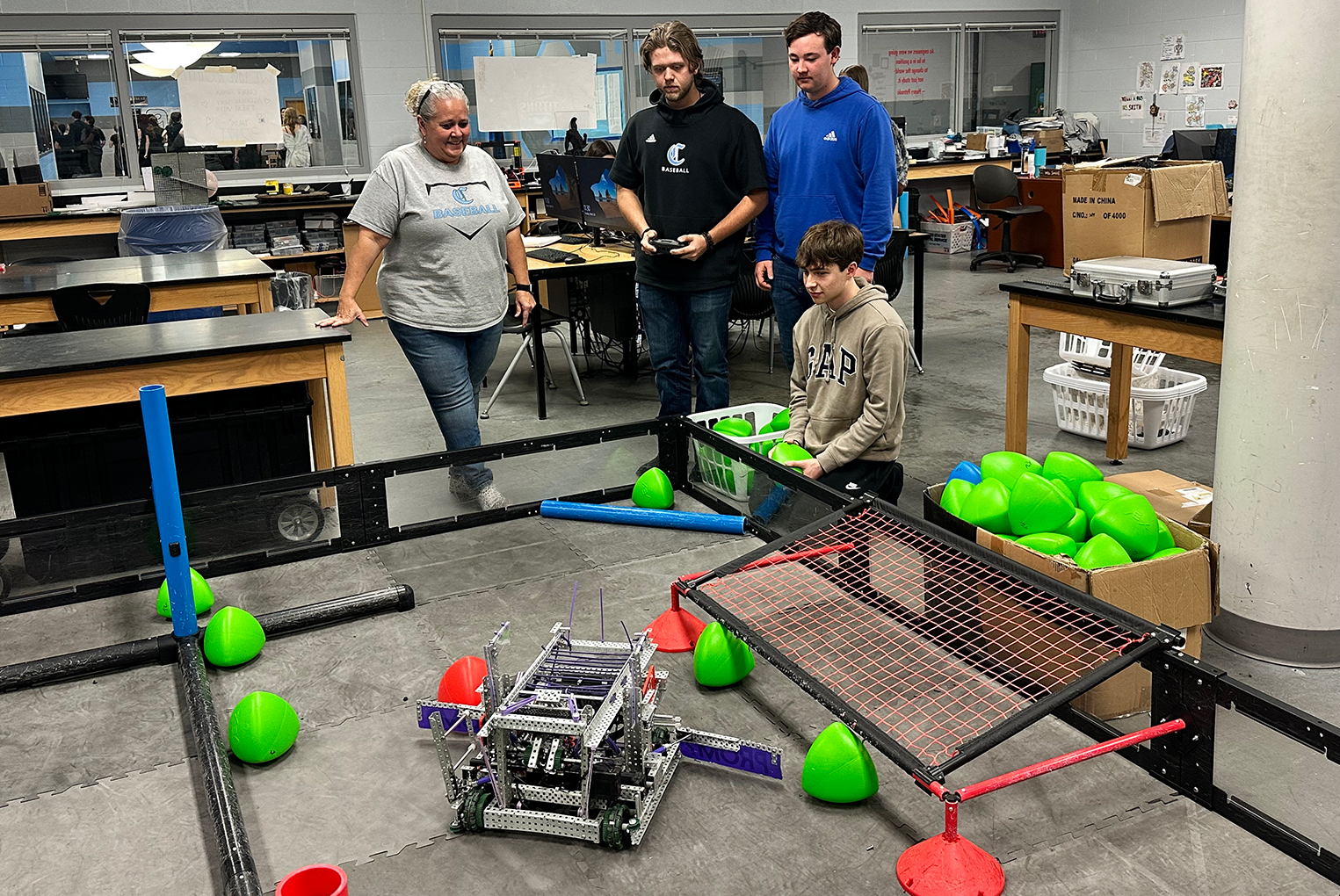
Students in Christina Cornelius’ class had to decide if Javon Walker, dressed as a farmer, created goods or services during an activity about producers and consumers at James E. Farmer Elementary School (Jefferson County).
Photo by Amy Wallot, Aug. 27, 2013
By Matthew Tungate
matthew.tungate@education.ky.gov
A strange noise filled Missy Davis’ 5th-grade mathematics classroom at James E. Farmer Elementary (Jefferson County) one day last year. At first it sounded like an airplane, but then one of the student said something was leaking. Upon further inspection, Davis found it was coming from next door. She’s heard many strange noises coming from the classroom of 5th-grade social studies teacher Christina Cornelius, with whom she has been neighbors since the school opened in 2007.
“I opened the door to find the students wearing goggles and snorkels,” Davis said. “They were diving for artifacts. The dive site had been carefully mapped out on a grid in her classroom. There was a CD playing underwater noises. The kids had a blast, and the coordinate grid reinforced what I was teaching in math – it was a win/win.”
Cornelius’ love of experiential learning helped earn her the 2013 Kentucky History Teacher of the Year award from the Kentucky Historical Society. Tim Talbott, teacher professional development coordinator with the Kentucky Historical Society, said Cornelius’ hands-on creative approach to history with her students and use of Kentucky’s historical sites as an educational tool, both in the classroom and on field trips, were impressive factors that stood out to the judges.
Thirty-three teachers (the second-highest number in the nation) were nominated for the award in Kentucky, Talbott said. Cornelius will receive a $1,000 honorarium and will be in the running to be named 2013 National History Teacher of the Year this fall. James E. Farmer Elementary School’s library will receive a core archive of history books and educational materials from the Gilder Lehrman Institute of American History and HISTORY network. Cornelius also will be invited to a 2014 Gilder Lehrman Teacher Seminar, and James E. Farmer Elementary School will be named a Gilder Lehrman Affiliate School.
The underwater artifact search wasn’t Davis’ first such experience. When students learn about the American Revolution, Cornelius will have students wear a tricorn hat and pretend to ride horses while shouting, “The British are coming.” Davis will come out of her room to check on the commotion and say, “Oh, it’s Paul Revere Day,” and get back to her class.
“Occasionally I’ll get called next door to look at one of her students dressed up as an historical figure,” Davis said. “The whole class will be caught up in the excitement, and laughing at the thought of Napoleon wearing heels or Washington in a wig.”
Farmer Elementary Principal Shannon Conlon, who nominated Cornelius for the award, said scuba gear doesn’t even begin to tell the story of what she’s seen. Cornelius has turned her room into a Civil War battle camp that includes a fire decorated with red lights and a triage unit with a big red cross spray painted on a white sheet. Cornelius, whom the students call Ms. Coco, keeps costumes in her classroom so students can get in character or hold props to teach economic concepts such as goods versus services.
“In general, Ms. Coco’s class is typically fun for all students,” Conlon said. “It is a classroom where history comes alive.
Cornelius said her teaching style has been the same since she began in 1984. She has a fireman’s suit, a chef’s outfit, a jacket to portray Robert E. Lee and a stovepipe hat to portray Abraham Lincoln, among others.
“I’ve always loved to engage the students,” she said.
Many people think history is about teaching facts, but history is the story of our country and “it is so exciting and interesting,” Cornelius said.
Davis said Cornelius’ passion for what she teaches comes across to her students. Cornelius continues to learn and “Mr. Cornelius has had to pull the car over on many occasions so that his wife can visit an historical site that she has studied with her students,” Davis said.
Cornelius said she starts planning field trips in May for the following school year. She makes sure that students go on field trips and have experiential learning.
“It is that hands-on,” she said. “It’s being able to expose children to experiences that very possibly they may not be able to be exposed to within their own family.”
Louisville and Kentucky are lucky to have the number of historical sites they do, Cornelius said. She takes students to the Muhammad Ali and Slugger museums in Louisville, and spends an entire day in Frankfort with half at the Capitol and the other half at Liberty Hall. She also takes students to Riverside, the Farnsley-Moreman Landing.
But before they go to any of these sites she prepares them to understand the context of what they’re going to see, Cornelius said.
“So when they go to Farnsley-Moreman, they have base knowledge where they can really understand the artifacts in which they are studying,” she said. “I think it is imperative that the children be well-prepared before their visits.”
Davis said Cornelius helps students see their place in our world and make real connections with their community at the local, state, national and global levels.
“When we go on field trips to all of the wonderful historical sites in Kentucky, the kids are prepared,” Davis said. “They notice things that they’ve studied, and are quick to share some of the less known stories that Ms. Cornelius has shared in class.”
Such dynamic hands-on experiences bring ownership to the learning, Cornelius said. So the student who never raises his or her hand to start the year is the same student who in December is standing up and yelling, “Give me liberty or give me death,” she said.
“Do I want them to know some pertinent dates? Yes,” Cornelius said.” Do I really want them to remember what actually took place, why did this take place, can they make a connection to today’s history, or can they use their reasoning skills to see how slavery led to the Civil War? I want them to use thinking processes; I don’t necessarily think they need to memorize a bunch of dates.”
Davis said Cornelius goes beyond even that.
“They understand their responsibilities as citizens of Kentucky and the United States,” Davis said. “Her students are aware of philanthropic opportunities to help others in their community. They have collected funds for Haiti and the American Red Cross. They volunteer twice a year with Operation Brightside to pick up trash around the school, and collect toys for children in need.”
Conlon said Cornelius also feels a responsibility to teach students the importance of exercising the right to vote when the students become of age, to respect differences in opinion and to use critical thinking skills to solve problems.
“All of this, Ms. Coco does in a caring and fun way,” Conlon said.
MORE INFO…
National History Teacher of the Year
Christina Cornelius, christina.cornelius@jefferson.kyschools.us, (502) 485-8625








Leave A Comment